常用英语动词解析
常用英语动词
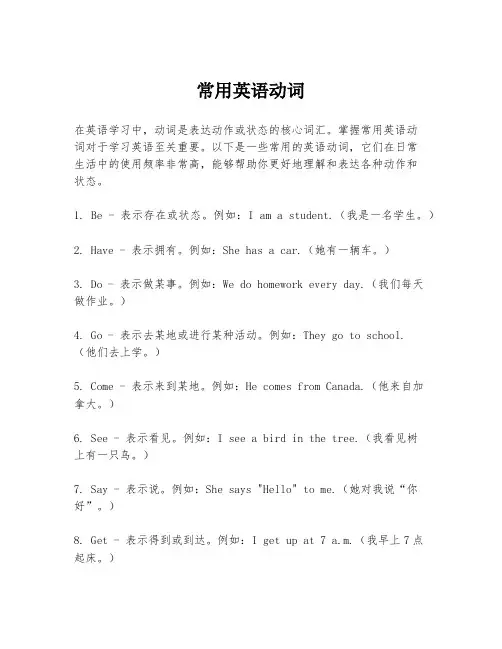
常用英语动词在英语学习中,动词是表达动作或状态的核心词汇。
掌握常用英语动词对于学习英语至关重要。
以下是一些常用的英语动词,它们在日常生活中的使用频率非常高,能够帮助你更好地理解和表达各种动作和状态。
1. Be - 表示存在或状态。
例如:I am a student.(我是一名学生。
)2. Have - 表示拥有。
例如:She has a car.(她有一辆车。
)3. Do - 表示做某事。
例如:We do homework every day.(我们每天做作业。
)4. Go - 表示去某地或进行某种活动。
例如:They go to school.(他们去上学。
)5. Come - 表示来到某地。
例如:He comes from Canada.(他来自加拿大。
)6. See - 表示看见。
例如:I see a bird in the tree.(我看见树上有一只鸟。
)7. Say - 表示说。
例如:She says "Hello" to me.(她对我说“你好”。
)8. Get - 表示得到或到达。
例如:I get up at 7 a.m.(我早上7点起床。
)9. Make - 表示制造或使成为。
例如:He makes a cake.(他做了一个蛋糕。
)10. Know - 表示知道。
例如:I know her well.(我非常了解她。
)11. Take - 表示拿或取。
例如:Please take your seat.(请坐下。
)12. Give - 表示给予。
例如:She gives me a book.(她给了我一本书。
)13. Find - 表示找到。
例如:I find my keys.(我找到了我的钥匙。
)14. Think - 表示思考。
例如:I think it's a good idea.(我认为这是个好主意。
)15. Tell - 表示告诉。
例如:He tells me the truth.(他告诉我真相。
常用英语动词的介绍
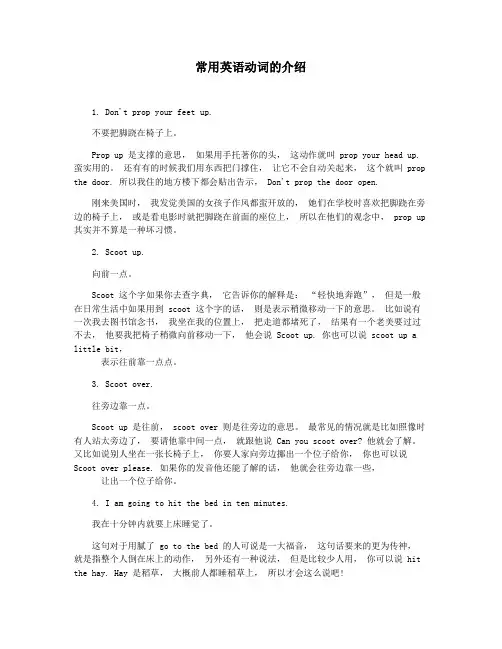
常用英语动词的介绍1. Don't prop your feet up.不要把脚跷在椅子上。
Prop up 是支撑的意思,如果用手托著你的头,这动作就叫 prop your head up. 蛮实用的。
还有有的时候我们用东西把门撑住,让它不会自动关起来,这个就叫 prop the door. 所以我住的地方楼下都会贴出告示, Don't prop the door open.刚来美国时,我发觉美国的女孩子作风都蛮开放的,她们在学校时喜欢把脚跷在旁边的椅子上,或是看电影时就把脚跷在前面的座位上,所以在他们的观念中, prop up 其实并不算是一种坏习惯。
2. Scoot up.向前一点。
Scoot 这个字如果你去查字典,它告诉你的解释是:“轻快地奔跑”,但是一般在日常生活中如果用到 scoot 这个字的话,则是表示稍微移动一下的意思。
比如说有一次我去图书馆念书,我坐在我的位置上,把走道都堵死了,结果有一个老美要过过不去,他要我把椅子稍微向前移动一下,他会说 Scoot up. 你也可以说 scoot up a little bit,表示往前靠一点点。
3. Scoot over.往旁边靠一点。
Scoot up 是往前, scoot over 则是往旁边的意思。
最常见的情况就是比如照像时有人站太旁边了,要请他靠中间一点,就跟他说 Can you scoot over? 他就会了解。
又比如说别人坐在一张长椅子上,你要人家向旁边挪出一个位子给你,你也可以说Scoot over please. 如果你的发音他还能了解的话,他就会往旁边靠一些,让出一个位子给你。
4. I am going to hit the bed in ten minutes.我在十分钟内就要上床睡觉了。
这句对于用腻了 go to the bed 的人可说是一大福音,这句话要来的更为传神,就是指整个人倒在床上的动作,另外还有一种说法,但是比较少人用,你可以说 hit the hay. Hay 是稻草,大概前人都睡稻草上,所以才会这么说吧!5. It won't be long before we hit the road.离我们上路的时间不久了。
初中英语动词及动词短语考点
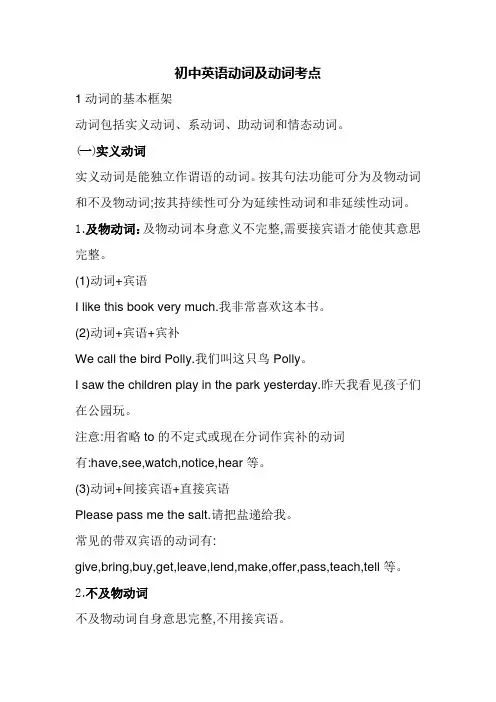
初中英语动词及动词考点1动词的基本框架动词包括实义动词、系动词、助动词和情态动词。
(一)实义动词实义动词是能独立作谓语的动词。
按其句法功能可分为及物动词和不及物动词;按其持续性可分为延续性动词和非延续性动词。
1.及物动词:及物动词本身意义不完整,需要接宾语才能使其意思完整。
(1)动词+宾语I like this book very much.我非常喜欢这本书。
(2)动词+宾语+宾补We call the bird Polly.我们叫这只鸟Polly。
I saw the children play in the park yesterday.昨天我看见孩子们在公园玩。
注意:用省略to的不定式或现在分词作宾补的动词有:have,see,watch,notice,hear等。
(3)动词+间接宾语+直接宾语Please pass me the salt.请把盐递给我。
常见的带双宾语的动词有:give,bring,buy,get,leave,lend,make,offer,pass,teach,tell等。
2.不及物动词不及物动词自身意思完整,不用接宾语。
Horses run fast.马跑得快。
(1)有些动词既可作及物动词又可作不及物动词。
We study English.我们学习英语。
(及物动词)We study hard.我们努力学习。
(不及物动词)(2)有些不及物动词与一些别的词搭配在一起构成动词短语,它的作用相当于一个及物动词。
①动词+介词Listen to the teacher carefully.仔细听老师讲。
此类动词短语后面的宾语无论是名词还是代词,都只能放在介词后面,不能放在动词和介词之间。
②动词+副词+介词Let’s go on with our work!让我们继续我们的工作吧!He gets along well with his classmates.他与他的同学们相处得很好。
英语动词用法详解
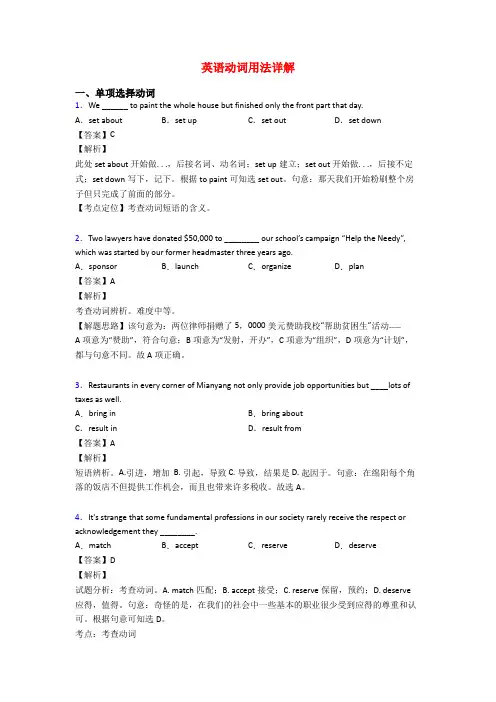
英语动词用法详解一、单项选择动词1.We ______ to paint the whole house but finished only the front part that day.A.set about B.set up C.set out D.set down【答案】C【解析】此处set about开始做. . .,后接名词、动名词;set up建立;set out开始做. . .,后接不定式;set down写下,记下。
根据to paint可知选set out。
句意:那天我们开始粉刷整个房子但只完成了前面的部分。
【考点定位】考查动词短语的含义。
2.Two lawyers have donated $50,000 to ________ our school’s campaign “Help the Needy”, which was started by our former headmaster three years ago.A.sponsor B.launch C.organize D.plan【答案】A【解析】考查动词辨析。
难度中等。
【解题思路】该句意为:两位律师捐赠了5,0000美元赞助我校“帮助贫困生”活动……A项意为“赞助”,符合句意;B项意为“发射,开办”,C项意为“组织”,D项意为“计划”,都与句意不同。
故A项正确。
3.Restaurants in every corner of Mianyang not only provide job opportunities but ____lots of taxes as well.A.bring in B.bring aboutC.result in D.result from【答案】A【解析】短语辨析。
A.引进,增加 B. 引起,导致 C. 导致,结果是 D. 起因于。
句意:在绵阳每个角落的饭店不但提供工作机会,而且也带来许多税收。
英语中最常用的200个动词(配音标)
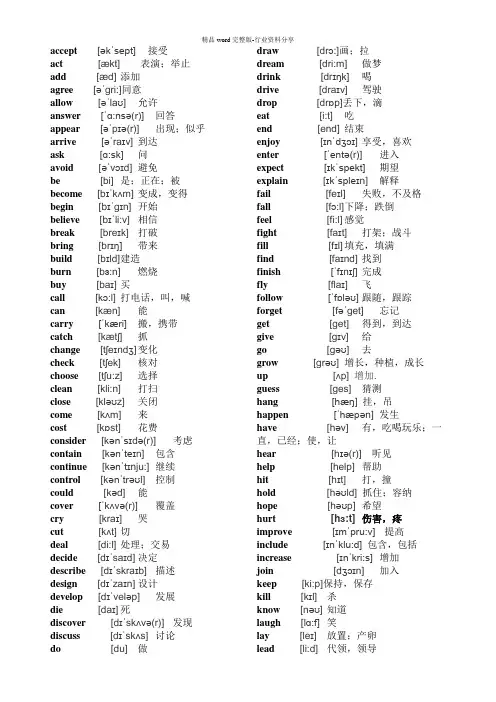
accept[əkˈsept]接受act [ækt] 表演;举止add [æd]添加agree [əˈgri:]同意allow[əˈlaʊ]允许answer[ˈɑ:nsə(r)]回答appear[əˈpɪə(r)]出现;似乎arrive[əˈraɪv]到达ask[ɑ:sk]问avoid[əˈvɔɪd]避免be[bi]是;正在;被become[bɪˈkʌm]变成,变得begin[bɪˈgɪn]开始believe [bɪˈli:v]相信break[breɪk]打破bring[brɪŋ]带来build [bɪld]建造burn[bɜ:n]燃烧buy[baɪ]买call[kɔ:l]打电话,叫,喊can[kæn]能carry[ˈkæri]搬,携带catch[kætʃ]抓change[tʃeɪndʒ]变化check[tʃek]核对choose[tʃu:z]选择clean[kli:n]打扫close[kləʊz]关闭come[kʌm]来cost[kɒst]花费consider[kənˈsɪdə(r)]考虑contain[kənˈteɪn]包含continue[kənˈtɪnju:]继续control[kənˈtrəʊl]控制could[kəd]能cover[ˈkʌvə(r)] 覆盖cry[kraɪ]哭cut[kʌt]切deal[di:l]处理;交易decide[dɪˈsaɪd]决定describe[dɪˈskraɪb]描述design[dɪˈzaɪn]设计develop[dɪˈveləp]发展die[daɪ]死discover[dɪˈskʌvə(r)]发现discuss[dɪˈskʌs]讨论do[du]做draw[drɔ:]画;拉dream[dri:m]做梦drink[drɪŋk]喝drive[draɪv]驾驶drop[drɒp]丢下,滴eat[i:t]吃end[end]结束enjoy[ɪnˈdʒɔɪ]享受,喜欢enter[ˈentə(r)]进入expect[ɪkˈspekt]期望explain[ɪkˈspleɪn]解释fail[feɪl]失败,不及格fall[fɔ:l]下降;跌倒feel[fi:l]感觉fight[faɪt]打架;战斗fill[fɪl]填充,填满find[faɪnd]找到finish[ˈfɪnɪʃ]完成fly[flaɪ]飞follow[ˈfɒləʊ]跟随,跟踪forget[fəˈget]忘记get[get]得到,到达give[gɪv]给go[gəʊ]去grow[grəʊ]增长,种植,成长up[ʌp]增加.guess[ges]猜测hang[hæŋ] 挂,吊happen[ˈhæpən]发生have[həv]有,吃喝玩乐;一直,已经;使,让hear[hɪə(r)]听见help[help]帮助hit[hɪt]打,撞hold[həʊld] 抓住;容纳hope[həʊp]希望hurt [hɜ:t]伤害,疼improve[ɪmˈpru:v]提高include[ɪnˈklu:d]包含,包括increase[ɪnˈkri:s]增加join[dʒɔɪn]加入keep[ki:p]保持,保存kill[kɪl]杀know[nəʊ]知道laugh[lɑ:f]笑lay[leɪ]放置;产卵lead[li:d]代领,领导learn[lɜ:n]学习leave[li:v]离开let[let]让lie[laɪ]说谎;躺,位于like[laɪk]喜欢listen[ˈlɪsn]听live[lɪv]居住look[lʊk]看lose[lu:z]输,失去love[lʌv]爱make[meɪk] 制作may[meɪ]可能,可以mean[mi:n]意思是;意味着meet[mi:t] 见面might[maɪt]也许miss[mɪs]思念;错过move[mu:v]移动must [məst]必须;肯定need[ni:d] 需要occur[əˈkɜ:(r)]发生offer[ˈɒfə(r)] 提供open[ˈəʊpən]打开pass[pɑ:s]通过pay[peɪ]付钱perform[pəˈfɔ:m]表演pick[pɪk]挑,捡plan[plæn]计划play[pleɪ]玩儿point[pɔɪnt]指(向)prepare[prɪˈpeə(r)]准备prefer[prɪˈfɜ:(r)]更喜欢produce[prəˈdju:s]生产protect[prəˈtekt]保护prove[pru:v]证明provide [prəˈvaɪd]提供pull[pʊl] 拉push[pʊʃ]推put[pʊt]放,放置raise[reɪz]提高;养(动物、家等);抬高reach[ri:tʃ]到达.read[ri:d]读realize[ˈri:əlaɪz]意识到;实现receive[rɪˈsi:v]收到reduce[rɪˈdju:s]减少,降低remain[rɪˈmeɪn]仍然remember[rɪˈmembə(r)]记得remove[rɪˈmu:v]移除,除掉report[rɪˈpɔ:t]报告require[rɪˈkwaɪə(r)]要求return[rɪˈtɜ:n]归还,回来rise[raɪz]上升ride[raɪd]骑,乘车ring[rɪŋ]打电话;响铃,敲钟run[rʌn]跑save[seɪv]挽救;保存say[seɪ]说see[si:]看到seem[si:m]似乎sell[sel]卖send[send]送,发送serve[sɜ:v]提供set[set]设置shake[ʃeɪk]摇,震shoot[ʃu:t]射击should[ʃʊd]应该show[ʃəʊ]给……看,表演shut[ʃʌt]关闭,关sing[sɪŋ]唱歌sit[sɪt]坐sleep[sli:p]睡眠Smell[smel]闻,闻起来sound[saʊnd]听起来speak[spi:k]讲话,说spend[spend]花费stand[stænd]站立start[stɑ:t]开始stay[steɪ]待在……,住在steal[sti:l]偷stop[stɒp]停止study[ˈstʌdi]学习suggest[səˈdʒest]建议support[səˈpɔ:t]支持swim[swɪm]游泳take[teɪk]带走;花费talk[tɔ:k]交谈,说话teach[ti:tʃ]教tell[tel]告诉,讲(故事)thank[θæŋk]感谢think[θɪŋk]想throw[θrəʊ]扔treat[tri:t]治疗;对待try[traɪ]尝试,努力turn[tɜ:n]旋转understand[ˌʌndəˈstænd] 明白use[ju:s]使用visit[ˈvɪzɪt]拜访,参观wait[weɪt]等walk[wɔ:k]走路want[wɒnt]想watch[wɒtʃ]观看,欣赏wash[wɒʃ]洗wear[weə(r)]穿will[wɪl]将会,将要win[wɪn]赢work[wɜ:k]工作worry[ˈwʌri]担心would[wʊd]将会write[raɪt]写。
英语动词用法和意义
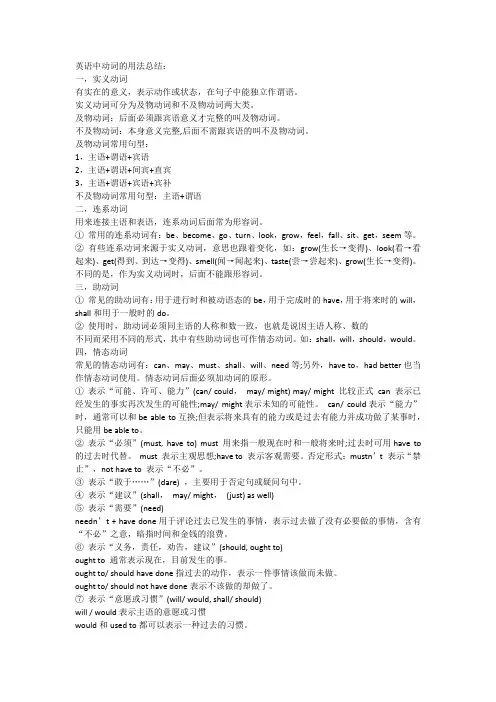
英语中动词的用法总结:一,实义动词有实在的意义,表示动作或状态,在句子中能独立作谓语。
实义动词可分为及物动词和不及物动词两大类。
及物动词:后面必须跟宾语意义才完整的叫及物动词。
不及物动词:本身意义完整,后面不需跟宾语的叫不及物动词。
及物动词常用句型:1,主语+谓语+宾语2,主语+谓语+间宾+直宾3,主语+谓语+宾语+宾补不及物动词常用句型:主语+谓语二,连系动词用来连接主语和表语,连系动词后面常为形容词。
①常用的连系动词有:be、become、go、turn、look,grow,feel,fall、sit、get,seem等。
②有些连系动词来源于实义动词,意思也跟着变化,如:grow(生长→变得)、look(看→看起来)、get(得到、到达→变得)、smell(闻→闻起来)、taste(尝→尝起来)、grow(生长→变得)。
不同的是,作为实义动词时,后面不能跟形容词。
三,助动词①常见的助动词有:用于进行时和被动语态的be,用于完成时的have,用于将来时的will,shall和用于一般时的do。
②使用时,助动词必须同主语的人称和数一致,也就是说因主语人称、数的不同而采用不同的形式,其中有些助动词也可作情态动词。
如:shall,will,should,would。
四,情态动词常见的情态动词有:can、may、must、shall、will、need等;另外,have to,had better也当作情态动词使用。
情态动词后面必须加动词的原形。
①表示“可能、许可、能力”(can/ could,may/ might) may/ might 比较正式can 表示已经发生的事实再次发生的可能性;may/ might表示未知的可能性。
can/ could表示“能力”时,通常可以和be able to互换;但表示将来具有的能力或是过去有能力并成功做了某事时,只能用be able to。
②表示“必须”(must, have to) must 用来指一般现在时和一般将来时;过去时可用have to 的过去时代替。
初中英语300动词详解(一)——do的用法(越简单越复杂)
初中英语300动词详解(一)——do的用法(越简单越复杂)动词 do 的用法:动词 do 在初中英语中主要有两种用法,一是作实义动词,二是作助动词,助动词的用法较多,较复杂!does(三单)- doing(现在分词)- did(过去式)- done(过去分词)一、do 作实义动词,译为“做,干”do homework 做作业 do housework 做家务Students do homework everyday. 学生每天都要做作业。
We do the housework every Sunday. 我们每周天做家务。
have...to do 有...要做I have a lot of work to do. 我有很多工作(事情)要做。
I have nothing to do. 我没什么事情要做。
have/there be nothing to do but do... 没什么可做的,只有...(考查but后用动词原形)I have nothing to do but read at night. 晚上除了读书,没其他什么可做的了。
There is nothing to do but watch TV. 没什么可做的,只有看电视。
do well in 擅长于... 等于 be good at(后接 sth. 或 doing)Tom does well in math. Tom擅长数学。
= T om is good at math.My sister does well in swimming. 我妹妹擅长游泳。
= My sister is good at swimming.When I was young, I did well in English. 我小的时候擅长学数学。
have...to do with... 与...有关系The man have a lot to do with the accident. 这个男人与事故有很大关系。
初中英语常用动词搭配和动词短语以及辨析
初中英語常用動詞搭配1. 動詞後接to doask sb. to do sth.請(叫)某人做某事tell sb to do sth 告訴某人做某事order sb to do sth. 命令某人做某事want sb to do sth. 想要做某事help sb. (to) do sth. 幫助某人做某事wish sb to do sth. 希望某人做某事would like to do sth. 想要做某事invite sb. to do sth. 邀請某人做某事drive sb. to do sth .驅使某人做某事expect sb. to do sth. 期待某人做某事forbid sb. to do sth. 制止某人做某事force sb. to do sth. 強迫某人做某事hope to do sth. 希望做某事offer to do sth. 主動提出做某事plan to do sth. 計畫做某事prepare to do sth. 預備做某事pretend to do sth. 假裝做某事promise to do sth. 許諾做某事decide to do sth. 決定做某事refuse to do sth. 拒絕做某事fail to do sth. 未能做某事happen to do sth. 碰巧做某事need sb to do sth 需要某人做某事2.動詞後接ingconsider doing sth. 考慮做某事enjoy doing sth. 喜歡做某事escape doing sth. 逃脫做某事feel like doing sth. 想要做某事finish doing sth. 完成做某事give up doing sth. 放棄做某事imagine doing sth. 想像做某事mind doing sth. 介意做某事practice doing sth. 練習做某事prevent doing sth. 阻止做某事put off doing sth. 推遲做某事risk doing sth. 冒險做某事forbid doing sth. 制止做某事forgive doing sth. 原諒做某事stop sb.from doing 阻止某人做某事appreciate doing sth. 感激做某事suggest doing sth. 建議做某事be/get used to doing sth. 習慣做某事pay attention to doing 注意做某事avoid doing 避免做某事3. 動詞後既接to又接ing(1) remember to do sth. 記得要做某事remember doing sth. 記得做過某事(2)forget to do sth. 忘記要做某事forget doing sth. 忘記做過某事(3) regret to do sth. 遺憾要做某事regret doing sth. 遺憾做過某事(4) try to do sth. 盡力做某事try doing sth. 試著做某事(5)stop to do sth. 停下來去做某事stop doing sth. 停止做(正在做の)某事(6) mean to do sth. 打算做某事mean doing sth. 意味著做某事(7) can’t help to do sth. 不能幫助做某事can’t help doing sth. 情不自禁做某事(8) go on/continue to do sth. 繼續做另一件事go on/continue doing sth. 繼續做同一件事(9) like/love/hate to do sth 具體活動(一次性)like/love/hate doing sth 表示習慣(一貫性)(10) need/want to do sth. 想要做某事(主動)need/want doing sth. 想要被做(被動)(11) allow sb. to do sth. 允許某人做某事allow doing sth 允許做某事(12) advise sb. to do sth. 建議某人做某事advise doing sth. 建議做某事(13) encourage sb. to do sth. 鼓勵某人做某事encourage doing sth. 鼓勵做某事(14) permit sb to do sth 允許某人做某事permit doing sth 允許做某事4. 動詞後接動詞原形do(1) let sb. do sth. 讓某人做某事(2) make sb. do sth. 使某人做某事=make sth done(3)have sb. do sth. 使某人做某事=have sth done(4)see sb. do sth. 看見某人做過某事see sb. doing 看見某人正在做某事(5)hear sb. do sth. 聽見某人做過某事hear sb. doing 聽見某人正在做某事(6)find sb. do sth. 發現某人做過某事find sb. doing sth. 發現某人正在做某事(7)watch sb. do sth. 察看某人做某事(8)had batter do sth. 最好做某事4.接雙賓語(一)雙賓語易位時需借助介詞toの常用動詞(多表示動詞の方向)bring sb. sth. = bring sth. to sb. 把某物帶給某人hand sb. sth. =hand sth. to sb. 把某物遞給某人lend sb. sth. = lend sth. to sb. 把某物借給某人mail sb. sth. = mail sth. to sb. 把某物寄給某人offer sb. sth. = offer sth. to sb. 將某物給某人pass sb. sth. = pass sth. to sb. 把某物遞給某人pay sb. sth. = pay sth. to sb. 付給某人某物(錢)read sb. sth. = read sth. to sb. 把某物讀給某人聽return sb. sth. = return sth. to sb. 把某物還給某人sell sb. sth. = sell sth. to sb. 把某物賣給某人send sb. sth. = send sth. to sb. 把某物送給某人show sb. sth. = show sth. to sb. 拿某物給某人看take sb. sth. = take sth. to sb. 把某物拿給某人teach sb. sth. = teach sth. to sb. 教某人某物tell sb. sth. = tell sth. to sb. 告訴某人某情況throw sb. sth. = throw sth. to sb. 把某物扔給某人write sb. sth. = write sth. to sb. 給某人寫信(二)雙賓語易位時需借助介詞forの常用動詞(多表示動詞の目の)book sb. sth. = book sth. for sb. 為某人預定某物buy sb. sth. = buy sth. for sb. 為某人買某物choose sb. sth. = choose sth. for sb. 為某人選某物cook sb. sth. = cook sth. for sb. 為某人煮某物draw sb. sth. = draw sth. for sb. 為某人畫某物find sb. sth. = find sth. for sb. 為某人找到某物get sb. sth. = get sth. for sb. 為某人拿來某物make sb. sth. = make sth. for sb. 為某人做某物order sb. sth. = order sth. for sb. 為某人訂購某物pick sb. sth. = pick sth. for sb. 為某人採摘某物prepare sb. sth. = prepare sth. for sb. 為某人準備某物save sb. sth. = save sth. for sb. 為某人留某物sing sb. sth. = sing sth. for sb. 為某人唱某物(歌)steal sb. sth. = steal sth. for sb. 為某人偷某物初中英語常用動詞短語整理5. Be 動詞結構be able to do 能夠做……be afraid to do (內心)害怕\不敢做某事be afraid of doing擔心出現doingの狀況、結果be angry with 對……生氣be at home = stay at home 待在家裏be back/in/out 回來/在家/外出be bad for 對……有害be busy doing/with sth忙於做……(忙於……) be careful of 當心,注意,仔細be covered with 被……覆蓋be different from與……不同be famous/known as 作為……出名be famous/known for 以……而著名be free 空閒の,有空be friendly/kind to對……友好be from = come from 來自…,什麼地方人be full of/filled with裝滿……be good at= do well in 擅長於…be good for對……有好處be (ill) in bed 臥病在床be interested in 對……感興趣be in trouble 處於困境中be late for 遲到be mad at 對……生氣be made from/of 由……製成be made in 在……地方製造be made up of由……構成be on 在進行,在上演,(燈)亮著be pleased with對…感到高興be polite/impolite to對某人有禮貌/不禮貌be popular with受……歡迎;be proud of對……感到自豪be ready for 為……作好準備be satisfied with對……感到滿意(高興)be surprised (at) 對……感到驚訝be strict in sth.對某事嚴格be strict with sb.對某人嚴格be supposed to do sth.應該做某事be used for doing被用來做某事be used to do被用來做某事be used to doing 習慣於be worried about =be anxious about 擔憂6.短語(首字母排列)aim at 針對…agree with sb. 同意某人の意見或建議ask for請求、索要ask for a day off請一天假add…to…把…和…加起來achieve a victory取得勝利arrive in到達﹙大地方﹚arrive at到達﹙小地方﹚argue with 與…爭吵apologize to 向…道歉break up with sb.與某人斷絕關係break out 爆發break down 出毛病,拆開break off解散,解雇break the rule違規break into破門而入believe in信任begin/start with以…開始belong to屬於…built…into…把…建成…base on以…為基礎borrow…from…向…借……come into being形成、出現come true 實現come for a visit來參觀come on 快,走吧,跟我來come back回來come to do sth.逐漸做某事come about 發生come from來自…come up with 提出主意想法come along出現、發生come over過來come into進入…裏come in 進來come out出來,出現,出版come out of從…裏出來catch up with 趕上…catch a fire著火catch hold of抓住…catch a bus趕公共汽車cut up 切碎cut in half 切成半cut off切斷﹙電源、水源﹚cut in line插隊care for關心、關愛care about在意call for號召call back回電話call at sp. 拜訪某地call on sb.拜訪某人call out呼喊call up給…打電話call sb. at some number給某人打某個號碼calm down 鎮靜下來communicate with 與…交流complain about 抱怨…can’ t wait to do sth.迫不及待做某事clean up 清理、打掃乾淨carry out 執行connect …to…把…和…連起來chat on line網上聊天check over檢查drop by 順便拜訪drop out of school輟學drop litter丟垃圾do an experiment 做實驗do an operation on sb. 給某人做手術do sth. in person親自做某事do business做生意do exercise 做操do with=deal with處理do wrong 做錯事do one’s homework =do one’lesson做作業do some sports做運動do morning exercises 做早操do well in做得好,擅長於do the dishes 洗餐具do one’s best to do sth.盡力做某事do some cleaning 掃除do some reading讀書do some shopping購物do some cooking做飯do the laundry洗衣服do some chores做雜務disagree with sb. 不同意某人意見describe…as…把…描繪為…die of 死於﹙直接內因,如疾病、饑渴﹚die from死於﹙間接外因,如車禍、天災﹚die out 滅絕drive sb. crazy使某人發瘋drive to…開車去…divide…into…把…分成…depend on依賴…decide on sth. 對……做決定dry out乾涸dry up 烘乾dream of 夢想…draw up起草、擬定dress up 裝扮、打扮e-mail sb.給某人發電子郵件enjoy oneself 玩得愉快enjoy doing sth. 喜歡做某事end up doing sth.結束做某事explain to sb sth=explain sth. to sb. 向某人解釋某事eat up吃光fall behind落後fall off 從……掉下fall down 滑到,倒下(後接賓語要加from)fall over向前摔倒、跌倒fall into 落入;陷入fall ill病倒fall asleep入睡fall in love with愛上、迷戀fight against與…作鬥爭follow the rules 遵守規則fail the exam考試不及格find out查明﹙原因、真相﹚feel like doing 想做某事fly a kite 放風箏fly to乘飛機去…fit into …適應…fill in =fill out 填充填寫fill…with…用…填…feel sorry for因…而難過fold the clothes疊衣服get on 上﹙車、船、飛機等﹚get off下﹙車、船、飛機等﹚get up起來、起床get good grades 取得好成績get over 客服get rid of 除掉…get to到達get out of 從…裏出來get into 進入get in the way of妨礙get together 聚會get into trouble陷入困境get out of trouble 脫離困境get used to﹙doing﹚sth.習慣﹙做﹚某事get to do sth.著手做某事get ready for為…做準備get sb. into trouble使某人陷入困境get away from遠離…get a sore back 背痛get back to sb. 過會兒與某人通話﹙打電話用語﹚get on/along well with 與相處…融洽get to know認識get married to與某人結婚get in touch with 與…取得聯繫go ahead 先走,向前走,去吧,幹吧go to…去…go home 回家go out 出去go out for…出去做…go down/along 沿著…走go to school上學go to the doctor’去醫務室go to the cinema 去看電影go across…穿過…﹙平面﹚go to work上班go bad變壞go by流逝﹙時間﹚go one’s own way走自己の路go for a walk 去散步go sightseeing去觀光go away 走開go to sleep 入睡go to bed 上床睡覺go on with繼續…go shopping 去購物go hiking 去遠足go abroad 出國go over復習go downstairs/upstairs下樓/上樓go on a trip 去旅遊give in﹙doing﹚sth.屈服﹙做﹚某事give up﹙doing﹚sth.放棄﹙做﹚某事give away 贈送give out 頒發give back 歸還give off 發出﹙氣味、煙霧等﹚give sb. some advice給某人提建議give a talk作報告give lessons to sb. 給某人上課give sb. a good beating 好好教訓某人一下give sb. a hand 幫某人忙grow up 長大have a good time 玩得愉快have a discussion 進行討論have a party 舉行聚會have a meeting 開會have nothing to do with與…無關have trouble with sth. 做某事有困難have difficulty/ trouble doing sth. 費力做某事have fun玩得愉快have a fever 發燒have a cold 感冒have a cough 咳嗽have a stamachache胃痛have fun doing sth.愉快地做某事have a match 舉行比賽have a fight with與…比賽、鬥爭have no idea of 不知道…have a hard time doing sth. 艱難地做某事have sth. to do with 與…有關have an accident 發生事故have breakfast/lunch/supper 吃早、午、晚飯have class上課have water喝水have a conversation with 與…會話have a look at 看一下…have a talk with與…談話have a problem with做某事有疑難have a good trip路途愉快have a try 試一下have a laugh at 嘲笑.…have a pity on sb.同情某人have a rest 休息一下have a word with 與……談幾句話hear of 聽說hear from 收到…の來信hands up舉手hand in上交hand out分發hold up 抓住、握住hold a meeting 舉行會議hold an exhibition舉行展覽happen to do sth.恰巧做某事hurry up 趕快hurry off 匆忙離開help oneself to sth. 隨便用…help sb. with sth.幫助某人做某事It’s one’s turn to do sth. 輪到某人做某事invite sb. to do sth.邀請某人做某事insist on doing sth..堅持做某事join in 穿著join together團結起來join the army 參軍join the party入黨keep(stay)away from 遠離keep out不讓進入keep down 壓低﹙音量等﹚keep a pet 飼養寵物keep in good mood 保持好心情keep on doing一直做某事keep healthy保持健康keep in good health保持健康keep up with跟上…keep sb. doing sth. 使某人一直做某事keep off 防禦keep in touch with與…保持聯繫knock at=knock on敲…knock into撞到某人身上learn…by oneself 自學…learn…from …向…學習learn…by heart 記住…leave for離開去某處leave sth. somewhere 把某物忘在某處leave school畢業leave one by oneself 把某人單獨留下leave a message for sb.給某人留個口信lead to導致live on…以…為生live a happy life 過著幸福の生活look after照看…look for 尋找…look down on 藐視…look up查找﹙字詞等﹚look over檢查﹙身體等﹚look forward to盼望…look on …as 把看作…look at看…look like 看起來像…look around環顧look out當心look out of 向…外面看look through 流覽look the same 看起來一樣look inside向…裏面看laugh at嘲笑lose touch with與…失去聯繫let sb. in 讓某人進去lie dowm躺下make sb. feel at home使某人感到賓至如歸make one’s mind to do sth. 決心做某事make a face=make faces 做鬼臉make money掙錢make fool of sb.愚弄某人make a journey旅行make progress 取得進步make a countribution to為…做貢獻make a noise 吵鬧make a fire 生火make a mistake 犯錯誤make…of…由…製作…﹙看出原材料﹚make…from…由…製作…﹙看不出原材料﹚make up編造,虛構,打扮,構成,組成make up of…由…組成make a plan 定計劃make one’s bed 整理床鋪make a report 編寫報告make sure of確信…make use of 利用…make a sentence with用…造句make a decision做出決定make oneself understood 表達自己の意思make a survey of 調查…make preparation for 為…做準備make friends with與……交朋友make a living謀生major in專修match …with …把…和…搭配起來move to搬到…mistake…for…把…錯認為…meet with 遇到﹙困難、麻煩等﹚mix up混合name sb./sth.X把某人/某物叫做Xorder sb. to do sth.命令某人做某事open up完全打開play football 踢足球play chess 下棋play cards打牌play bridge打橋牌play the guitar 彈吉他play the violin彈小提琴play sports 做運動play games 玩遊戲play with 玩耍…play jokes on sb.對某人開玩笑play the CD.播放play the music 播放音樂play a part in在…中扮演角色play a role of 扮演…の角色play against與…比賽play hide-and-seek捉迷藏pay for付…款pay attention to 注意…pass by 路過…put on 穿上、上映put down 寫下put away把…收拾起來put…into…把…放入…裏put up 舉起、張貼put out 熄滅put off 推遲put back 放回prevent sb.﹙from﹚doing sth.阻止某人做某事prefer to do rather than do與做另一件事相比更喜歡做某事prefer﹙doing﹚sth. to ﹙doing﹚sth. 與…相比更喜歡…point to 指向poin at 指著point out指出practice doing sth.練習做某事pick up 拾起,接人,站起,收聽run away 逃跑run after 追趕run out of 用光、從…裏跑出來run over to…跑過去到…read sth. to sb. 把某物讀給某人聽read sth. for sb. 替某人讀某物receive a letter from…收…到來信rain heavily 下大雨ride a bike騎自行車rise up升起raise money 籌集資金refer to涉及、提到regard…as…把…看作…reach out 伸出﹙手等﹚send up發射send an e-mail 發送電子郵件send for…派人請…send…for…派…請…send into 送入…裏send away驅逐send off解雇send out 發出,發出,派遣shake hands with與…握手stick…into…把…插入…裏stick doing sth.堅持做某事stop sb. from doing sth.阻止某人做某事stare at 盯著…sell out買光see a doctor 看醫生see sb. off為某人送行see a film 看電影say goodbye to sb.向某人告別say hello to sb.向某人問好set up 豎立、建造set up one’s mind on sth.全神貫注於…set off 出發,動身,使爆炸,引起set out 出發,啟程,開始,著手set an example for 為……樹立榜樣speak of 講到speak highly of 稱頌…search for 搜索,尋找start to do sth.著手做某事start with …以…開始spend﹙time/money﹚on sth.= spend﹙time/money﹚﹙in﹚doing sth.花費﹙時間/金錢﹚做某事spend time with sb. 和某人呆在一起sort…into…把…劃分成…show sb. around somewhere領某人參觀某處show up 露面stay in bed 呆在床上slow down減速smile at對…微笑suit sb.適合某人share…with…與…分享…stay up 熬夜stand for代表,象徵stand up起立succeed in doing sth.成功地做某事shut up關閉shout to (為了讓人聽到)對…喊shout at (因生氣等)向…喊seem like 好像sweep the floor拖地step on 踐踏,踩take a message for sb.給某人捎個信take a bus乘工交車take one’s order按某人の順序take a walk 散步take…to…把…帶到…去take a shower淋浴take after 與…相像take away 帶走take the medicine 服藥take exercise鍛煉take it easy不要緊take one’s temperature量某人の體溫take off 起飛/脫下﹙衣服、鞋帽等﹚take a lesson/class 上課take a day off 休一天假take an exam 參加考試take…out of…把…從…中取處來take a rest休息一下take one’s turn to do sth.按某人順序做某事take part in 參加﹙活動﹚take…as an example拿…當作例子take over接管take care of照顧、照看take in吸取,吸收take up 佔據﹙空間、時間﹚take the pride in 以…而驕傲﹙強調動作﹚take place 發生﹙不及物﹚take the leading position占主導地位take a swimming course上游泳課take a deep breath深呼吸take the place of 代替…take a photo of 照…の相talk about談論…talk with 與…談話talk to對…談話turn left﹙right﹚向左﹙右﹚轉turn up 調高﹙音量等﹚turn down調低﹙音量等﹚turn on打開﹙電器、煤氣、水龍頭﹚turn off 關閉﹙電器、煤氣、水龍頭﹚turn over翻開,翻轉turn…into…把…變成…turn to…轉向…turn green 變綠think about考慮、思考…think of想起、想到…think over仔細考慮think up想出(設計出、發明、編造)tell sb. about sth. 把某物の情況告訴某人tell a joke 講笑話tell a story 講故事try on 試穿try one’s best to do sth. .盡力做某事thanks for感謝…travel to …到…旅行tie…to…把…綁到…上treat …as…把…當作…來對待trouble sb. to do sth. 麻煩某人做某事throw away 扔掉translate…into…把…翻譯成…urge sb. to do sth. 強烈要求某人做某事use up用盡used to do sth. 過去經常做某事visit sb/somewhere看望某人/參觀某處wake up醒來、叫醒welcome to…歡迎到…來wait for等待…wait in line 排隊等候write to …給…寫信write down記下win the World Cup 贏得世界盃win a prize獲獎wear out穿壞wear glasses戴眼鏡wipe off 擦去,拭去work out 解決﹙問題、麻煩等﹚work on從事…walk along/down 沿著…走watch a game觀看比賽warn sb. to do sth.告誡某人做某事warn sb. of sth. 警告某人某事warn sb. against(doing) sth.告誡某人當心某事/不要做某事worry about…擔心…中考英語近義動詞(片語)辨析1. 辨析take;cost;spend;pay主語為人の有spend和pay;主語為物の有cost;主語常為“it”の有take.(1)spend多用人作主語,後接金錢或時間。
英语最常用动词
英语最常用动词Aachieve vt. 达到,取得act v. 表演,扮演(角色),演出(戏);行动,做事add vt.添加,增加admire v. 钦佩;羡慕admit vt. 承认,准许(入场,入学,入会)advance v. 推进,促进;前进advise vt. 忠告,劝告,建议afford vt. 负担得起(……的费用);抽得出(时间);提供agree v. 同意;应允allow vt. 允许,准许answer v. 回答,答复;回信;(作出)答案apologize vi. 道歉,谢罪appreciate v. 欣赏;感激argue vi. 争辩,争论arrive vi. 到达;达到ask v. 问,询问;请求,要求;邀请attend v. 看护,照料,服侍;出席,参加Bbe v. 是(原形),其人称和时态形式有am, is, are, was, werebear v. 承受,负担,承担;忍受;容忍beat (beat, beaten) v. 敲打;跳动;打赢become (became, become) v. 变得;成为begin(began, begun) v. 开始,着手behave v. 守规矩,行为believe v. 相信,认为bend (bent, bent) vt. 使弯曲bite (bit, bitten) v. 咬;叮blame v. 责备;责怪blow (blew, blown) v. 吹;刮风;吹气board v. 上(船、火车、飞机)book v. 预定,定(房间、车票等)borrow v. (向别人)借用;借break (broke, broken) v. 打破(断, 碎);损坏,撕开breathe vi. 呼吸bring (brought, brought) vt. 拿来,带来,取来broadcast(broadcast, broadcast)vt. 广播brush v. 刷;擦build (built, built) v. 建筑;造burn (~ed, ~ed 或burnt, burnt) v. 燃,烧,着火;使烧焦;使晒黑buy (bought, bought) vt. 买;购买Ccall v. 称呼;呼唤;喊,叫can (could) can't = can not modal v. 可能;能够;可以不能care v. 介意……,在乎;关心carry vt. 拿,搬,带,提,抬,背,抱,运等cast (cast, cast) v. 扔,抛,撒catch(caught, caught)v. 接住;捉住;赶上;染上(疾病)change v. 改变,变化;更换;兑换charge v. 要求收费;索价;将(电池)充电chat vi.聊天,闲谈cheat v. 骗取,哄骗;作弊check vt. 校对,核对;检查;批改cheer vi.欢呼;喝彩choose (chose, chosen) vt. 选择clean vt. 弄干净,擦干净climb v. 爬,攀登close vt. 关,关闭collect vt. 收集,搜集communicate v. 交际;传达(感情,信息等)connect vt. 连接,把……联系起来consider vt. 考虑continue vi. 继续control vt. 控制cook v. 烹调,做饭copy v. 抄写;复印;(计算机用语)拷(备份盘)cost (cost, cost) v. 值(多少钱);花费cover v. 覆盖,遮盖;掩盖create vt. 创造;造成cry v. 喊叫;哭cut (cut, cut) v. n. 切,剪,削,割伤口Ddance vi. 跳舞dare v.& aux. (后接不带to的不定式;主要用于疑问,否定或条件句)敢,敢于decide v. 决定;下决心defeat vt. 击败;战胜delay v.拖延,延误,延迟,延期;耽搁deliver vt. 投递(信件,邮包等)demand vt. 要求depend vi. 依靠,依赖,指望;取决于describe vt. 描写,叙述desire vt.要求;期望destroy vt. 破坏,毁坏determine vt. 决定;决心develop v.(使)发展;(使)发达;(使)发育;开发vt. 冲洗(照片)devote vt. 把……奉献;把……专用(于)die v. 死dig (dug, dug) v. 挖(洞、沟等);掘disappear vi. 消失discover vt. 发现discuss vt. 讨论,议论do (did, done) don't=do not v. & aux. 做,干(用以构成疑问句及否定句。
英语常用动词辨析
常用动词辨析例词absorb吸收accuse指责add加admire羡慕admit承认affect影响afford担负airmail 航空邮件allow允许appoint认命annoy使生气arrange安排ask问attend参加announce宣布avoid避免await等待approach接近awake唤醒assure使放心astonish使惊讶attempt企图believe相信betray背叛borrow借bother打扰break破坏broadcast广播bring带来brush刷burn燃烧bury埋buy买call叫carry携带catch抓住cause导致change改变charge主管choose选择claim声明clean使清洁clear清除collect收集compete完成comfort安慰comb梳cut切confess忏悔contain含有control控制cross越过correct纠正cook煮,烹consider考虑concern与……有关系;涉及cover掩盖cure治愈要点解释在英语学习中,必须掌握同义词、易混词、相似词及相近短语之间的区别,搞清英语和汉语之间的差别。
词语辨析,尤其是动词词语辨析正成为高职考试的热点。
1.accept与receive释义:两个词都有“收到、接到”的意思,如收到信件、邀请、礼物等。
receive指“收、接”的动作,变成客观事实;accept是“接受、领受”的意思,表示当人主观“乐意”接受的态度。
receive还可以表示“接见、接待”,accept则没有这种意义。
例句:I received /got a birthday present yesterday, but I didn’t accept it.我昨天收到一份生日礼物,但我没有接受。
He isn’t well enough to receive visitors yet.他的身体状况还是不能接见来宾。
- 1、下载文档前请自行甄别文档内容的完整性,平台不提供额外的编辑、内容补充、找答案等附加服务。
- 2、"仅部分预览"的文档,不可在线预览部分如存在完整性等问题,可反馈申请退款(可完整预览的文档不适用该条件!)。
- 3、如文档侵犯您的权益,请联系客服反馈,我们会尽快为您处理(人工客服工作时间:9:00-18:30)。
她手里拿着一支钢笔,开始写起来。
Go and take some coffee cups.
去拿几个咖啡杯。
11. be
When will the wedding be?
婚礼何时举行?
He is coming.
他来了。
12. do
Do you like apples ?
你喜欢苹果吗?
I do love English .
5. keep
May I keep the book?
我可以留下这本书吗?
Sorry to have kept you waiting.
对不起,让你久等了。
Should I keep the secret?
我要保守秘密么?
6. let
Let us pray.
让我们祈祷吧。
Let him tell you what has happened.
我们可以收看到15个频道的电视节目。
Go (and) get your notebooks.
去把你的笔记本拿来。
to get information
获得情报
to get a present
收到礼物
3. give
He gives me his cold.
他把感冒传给我。
He gives her a handsome present.
他送给她一份精美的礼物。
He gives his books to the school.
他把他的藏书捐赠给了学校。
4. go
Go get a doctor.
去叫医生来!
How can I go to the supermarket?
我怎样去超市啊?
I have to go today.
今天我必须走。
常用英语动词解析
1. come
Come here!
到这里来!
I've come to say good-bye.
我是来向你辞行的。
The train is coming.
火车来了。
He comes from the Netherlands.
他是荷兰人。
2. get
We can get 15 channels on TV.
让他告诉你发生了什么事情。
The secretary let me into the office.
秘书让我进了办公室。
7. Make
Make yourself comfortable.
请随意。
This car is made in China.
这辆汽车是中国制造的。
Did you make this shirt or buy it?
要表里如一。
It seems as if it is going to rain.
看来快下雨了。
She seems better today.
看上去她今天好些了。
10. take
Be careful not to take a cold.
小心不要着凉。
Taking a pen in her hand,she began to write.
这件衬衣是你自己做的还是买的?
8. put
I put a question to him.
我向他提出一个问题。
Put the box here.
把箱子放在这里。
I put the book on the table.我把书来自在桌子上了。9. seem
Be what you seem (to be).
